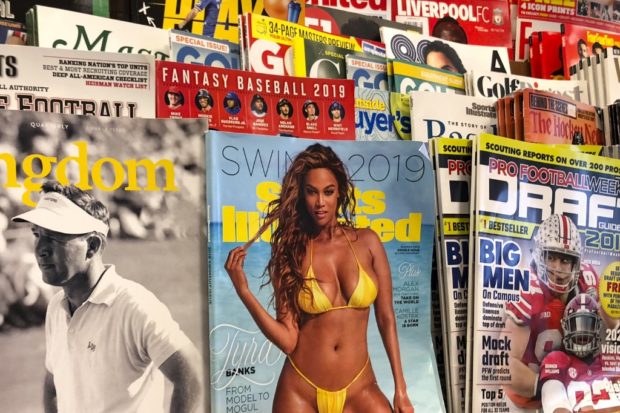
Copies of the Sports Illustrated Swimsuit Edition sit for sale on a shelf at a bookstore, May 28, 2019, in New York City. Media company Meredith announced on Monday that it has agreed to sell the Sports Illustrated magazine brand to U.S-based entertainment company Authentic Brands Group for $110 million. AFP
NEW YORK, United States — For decades, “Sports Illustrated” has played a unique role in chronicling major competitions like the Olympics and the highs and lows of athletic icons from Muhammad Ali to Serena Williams.
But the fortunes of the 65-year-old magazine — known also for its annual swimsuit issue — will now be tied to a sale of the Sports Illustrated name that envisions re-fashioning the enterprise into a “leader in lifestyle and entertainment,” as its new owner put it.
Under a transaction unveiled Monday, SI owner Meredith Corporation sold the brand’s intellectual property to Authentic Brands Group for $110 million.
The deal grants ABG access to more than two million images owned by the magazine and website, as well as the “Sports Illustrated” brand for purposes such as events and conferences, video production and sports gambling, the companies said in news releases.
Editorial control for the magazine and website will rest with Meredith for “at least two years,” with Merdith paying ABG an undisclosed licensing fee, according to a Meredith news release.
“As one of the most iconic brands in sports media, SI is a cultural centerpiece with massive opportunities for growth across its burgeoning digital, TV and social platforms and industry-leading print magazine,” said Jamie Salter, founder and chief executive of ABG.
“SI’s trusted name and fiercely devoted following set the stage for the brand to become a leader in lifestyle and entertainment.”
Tough business
The deal comes as magazines, as with newspapers, contend with diminishing readerships and advertising funds as more marketers commit dollars to online platforms.
Such challenges have buffeted weekly publications such as Time, Fortune and Sports Illustrated, which were all sold to Meredith by Time in 2018.
Sports Illustrated has long enjoyed unique cache in providing thoroughly reported and sharply-written accounts of just-completed games, as well as legacy-defining profiles of Michael Jordan, Tiger Woods and other stars. SI is also known for its sweeping narratives surrounding infamous figures such as Pete Rose, Mike Tyson and Tonya Harding.
With the ABG deal, Sports Illustrated sees a parallel to the strategy taken by publications such as the New York Times and Wall Street Journal, which have turned to conferences, travel seminars and podcasts as a means to raise funds for journalism.
“We are now perfectly positioned, with the support and resources of ABG, to thrive in many other spaces: events and conferences, licensing, gambling and gaming, IP development, especially in video and TV, to name a few, all while continuing to benefit from Meredith’s industry-leading track record in operating media companies,” said SI Editor-in-Chief Chris Stone.
Stone said the development of “independent, award-winning journalism and storytelling” remains the “heart of SI.”
Gambling on gambling?
However, some in sports journalism expressed concern about the future of the publication.
“Really hope my colleagues get to keep doing the in-depth, high-end work that they do so well. So much talent and tradition at SI,” said New York Times tennis writer Christopher Clarey on Twitter.
The announcement’s mention of gambling also raised concerns for Kelly O’Keefe, a professor of brand management at Virginia Commonwealth University.
O’Keefe said monetizing the SI brand through quality sports programming was a logical extension for the company and could find a market with a company like Netflix that might want sports programming but has little direct expertise.
But O’Keefe said SI’s interest in sports gambling was “worrisome” and potentially detrimental to the brand’s long-time value.
Seven US states have legalized sports gaming since a monumental US Supreme Court decision a year ago, but the venture remains controversial in many circles. Companies such as Disney have kept their distance.
“The brand is reasonably untarnished,” O’Keefe said. “There are many ways to put meat onto this brand without stepping into something so problematic.” /cbb

